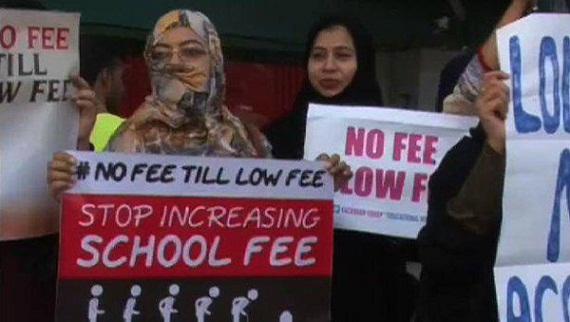HEADLINE
Parents protest against private schools in Pakistan
"With the government failing to improve education standards in the public sector, private schools have boomed over recent years. "
Naeem Sahoutara

Parents in Pakistan have launched a nationwide campaign against private schools, after the institutions implement a huge fee hike.
With the government failing to improve education standards in the public sector, private schools have boomed over recent years.
But education activists say the dual system is leading to greater social divisions and inequity.
Naeem Sahoutara investigates from Karachi.
Frustrated parents have joined this protest in Karachi to demand the government take action against private schools for the exorbitant spike in fees.
Ahmed Khan, a father of two children who study at a Karachi private school, explains.
“For the past five to 10 years the parents are suffering because the private schools are continuously raising their fees. But, unfortunately the private schools in Karachi are not providing quality education to the children, but they are charging heavy fees in the name of quality education,” he says, “These private schools have become a mafia. They are grabbing money.”
Ahmed Khan earns up to 1,000 US dollars a month and spends half of his salary on his children’s education.
He is a deputy director of the education department in Sindh province, but he doesn’t want to send his children to public school because the standards are so low.
Most here can’t afford private schooling – and after the recent increase it is becoming more difficult for the parents like Khan too.
“I belong to the middle class and what we want is to just to send our children to a good school to give them a better education,” he says, “The private schools are charging extra in the name of extra-curricular activities like books, etc. But the real story is that they charge extra money for every value added service other than the tuition fees.”
After the government levied a tax on various services in the private sector, private schools increased their fees by up to 20 percent this August.
In different cities across Pakistan, parents have taken to the streets to protest. Father of three, Syed Wajid Ali led the protest campaign in Karachi.
“The private schools used to increase the monthly tuition fees by 15 percent annually. But, this year they are demanding 18 to 20 percent more every month,” explains Ali, “I received text messages from other parents. And we started campaigns immediately.”
Some parents have even taken legal action after their children were expelled because they couldn’t pay.
Last month, the High Court in Karachi declared that one private school the, Generations School, could not take coercive action against parents to recover the fees.
Over recent years the private education sector has boomed because of the superior quality.
Mirza Kashif Ali Baig is the President of the All Pakistan Private Schools Federation.
“The government is bound to provide free primary education and the government has imposed different taxes on us,” he says, “But it is us who provide quality education. We are sharing the burden, but still we are abused by it.”
Almost half of the population in Pakistan is illiterate. Under the constitution, the government is responsible for providing free education, up to grade 10, for every child.
But education standards in the government schools are extremely poor.
Many classrooms lack basic needs such as desks, clean drinking water and toilets.
Parents that want their children to be well educated opt for private schooling if they can afford it, says Sohail Qureshi.
“Nobody wants to get their children into low standard schools,” says Qureshi, “Everyone wants to send their children to the private universities.”
Prime Minister Muhammad Nawaz Sharif has ordered an inquiry into the fee hike and promised to resolve the issue.
But education activist Ibrahim Abbas says that is just one fix in a public school system riddled with problems.
“The primary reason is mass level of bureaucratic corruption. Secondly, the lack of political willingness in developing this sector,” he says, “If you look deeply into the issue you might come to the conclusion that... keeping them illiterate seems a hidden agenda.”
Others, like protestor Khadija Fatima, worry that such poor standards at government schools will result in deep social divides.
“All over the Pakistan there should be a unified syllabus taught,” she says, “There should no division of poor and rich children.”
- Naeem Sahoutara
- private school Pakistan
- Pakistan education system
- eng
Komentar (0)
KBR percaya pembaca situs ini adalah orang-orang yang cerdas dan terpelajar. Karena itu mari kita gunakan kata-kata yang santun di dalam kolom komentar ini. Kalimat yang sopan, menjauhi prasangka SARA (suku, agama, ras dan antargolongan), pasti akan lebih didengar. Yuk, kita praktikkan!